 |
| Pix Credit: HERE |
China is celebrating the centenary of the establishment of the Chinese Communist Party this year. In some respects this is a remarkable achievement given the historical circumstances of its founding and events thereafter. As with most great markers of the great events of global orders (what I have been calling post-global empire)--the celebration of the US Declaration of Independence occurs only a few days after--the centenary has been marked by substantial pomp and pageantry. These are occasions in which it is necessary for the core of leadership to take stick, to congratulate the collective on its sacrifice, to point the way forward, and to underline the core normative premises through which that forward movement will be both given meaning and managed. None of this is extraordinary in itself; though it is necessary and expected, and for that reason, quite important public performances of fidelity to the past and of a showing of allegiance in the present and commitment to a future course that is itself a product of past and present.
 |
| Pix Credit HERE |
Though the lifespan of institutions (including states, enterprises, and other social structures) may exceed the span of a human life many times over, it is the span of a human life that gives value to such long-lived expressions of the collective humanity from out of which it is spawned, nourished, and used. The same applies to ideas, and to principles on which human organizations are incarnated, and to all structures through which humans are trained to "see the world" they believe they make. The rhythm of such measures, of course, are also creatures of the systems invented by humans to count such things. Since the Enlightenment (and its more abrupt expression in the revolutionary transformations in France after 1789), the way that many humans count is based on systems of 10. The English counted for a while based on systems of 12, and the Americans still do. But there is an elegance (at least for those nourished on the principles of Enlightenment counting) to 10 that adds significance to measuring the passage of times in blocks of 10, and in multiples of 10 (centuries, millennia, epochs, etc.). That rhythm, then, also produces the temporal spaces within which it is possible to take the measure of a thing. (Open Call for Input from the UN Working Group for Business and Human Rights: Next Decade 10+ "Business and human rights – towards a decade of global implementation" )
 |
| Pix Credit HERE |
「中國人民站起來了,中華民族任人宰割、飽受欺凌的時代一去不復返了!」、「只有社會主義才能救中國,只有中國特色社會主義才能發展中國!」、「改革開放是決定當代中國前途命運的關鍵一招」、「中華民族迎來了從站起來、富起來到強起來的偉大飛躍,實現中華民族偉大復興進入了不可逆轉的歷史進程!」["The Chinese people have stood up, and the era when the Chinese nation was slaughtered and bullied is gone forever!", "Only socialism can save China, and only socialism with Chinese characteristics can develop China!", "Reform and opening up is the key to determining the future and destiny of contemporary China", "The Chinese nation has ushered in a great leap from goals of standing up, and getting rich to goals of becoming strong, and realizing that the Chinese nation has entered a historically irreversible process of rejuvenation of the Chinese nation!"] (here).
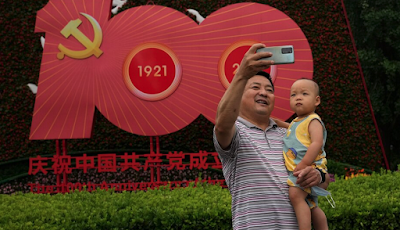 |
| Pix Credit HERE |
中國共產黨和中國人民以英勇頑強的奮鬥向世界莊嚴宣告,中國人民不但善於破壞一個舊世界、也善於建設一個新世界,只有社會主義才能救中國,只有中國特色社會主義才能發展中國![The Communist Party of China and the Chinese people solemnly declare to the world with brave and tenacious struggle that the Chinese people are not only good at destroying an old world, but also good at building a new world. Only socialism can save China, and only socialism with Chinese characteristics can develop China!].
The speech is well worth reading carefully for the hints that it contains of refinement of Chinese Marxist-Leninism in the "New Era" but more importantly of the expression of New Era Marxist Leninism in the form of concrete domestic and international objectives, approaches, principles, and attitudes. In that respect, the speech may well contain at least parts of a draft of Xi Jinping's Report to the upcoming 20th Chinese Communist Part Congress scheduled for 2022.
中共建黨百年|習近平七一講話全文
最後更新日期:慶祝中國共產黨成立100周年大會今日(7月1日)上午8時在北京天安門廣場舉行,中共總書記習近平發表重要講話。
習近平甫一開首就宣告中共已實現第一個百年奮鬥目標,在中國全面建成小康社會,歷史性解決絕對貧困問題。他又表示,中共現時正在向全面建成社會主義現代化強國的第二個百年奮鬥目標邁進。
此外,習近平特別提到4個「向世界莊嚴宣告」,分別是「中國人民站起來了,中華民族任人宰割、飽受欺凌的時代一去不復返了!」、「只有社會主義才能救中國,只有中國特色社會主義才能發展中國!」、「改革開放是決定當代中國前途命運的關鍵一招」、「中華民族迎來了從站起來、富起來到強起來的偉大飛躍,實現中華民族偉大復興進入了不可逆轉的歷史進程!」
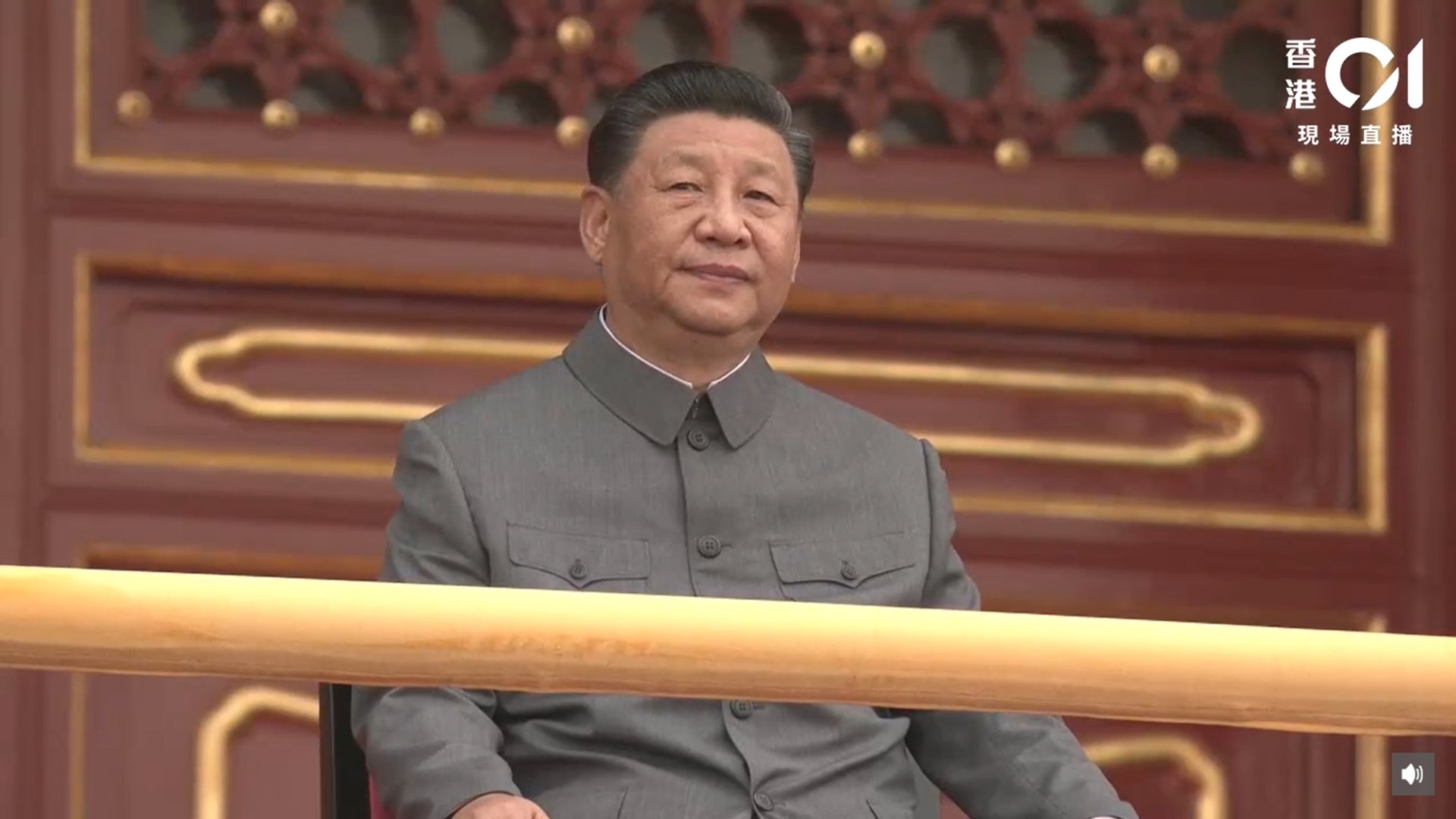
習近平在天安門城樓上發表重要講話。(01直播截圖)
以下為習近平重要講話全文:
同志們,朋友們:
今天,在中國共產黨歷史上,在中華民族歷史上,都是一個十分重大而莊嚴的日子。我們在這裏隆重集會,同全黨全國各族人民一道,慶祝中國共產黨成立一百周年,回顧中國共產黨百年奮鬥的光輝歷程,展望中華民族偉大復興的光明前景。
首先,我代表黨中央,向全體中國共產黨員致以節日的熱烈祝賀!
在這裏,我代表黨和人民莊嚴宣告,經過全黨全國各族人民持續奮鬥,我們實現了第一個百年奮鬥目標,在中華大地上全面建成了小康社會,歷史性地解決了絕對貧困問題,正在意氣風發向着全面建成社會主義現代化強國的第二個百年奮鬥目標邁進。這是中華民族的偉大光榮!這是中國人民的偉大光榮!這是中國共產黨的偉大光榮!
同志們、朋友們!
中華民族是世界上偉大的民族,有着5000多年源遠流長的文明歷史,為人類文明進步作出了不可磨滅的貢獻。1840年鴉片戰爭以後,中國逐步成為半殖民地半封建社會,國家蒙辱、人民蒙難、文明蒙塵,中華民族遭受了前所未有的劫難。從那時起,實現中華民族偉大復興,就成為中國人民和中華民族最偉大的夢想。
為了拯救民族危亡,中國人民奮起反抗,仁人志士奔走吶喊,太平天國運動、戊戌變法、義和團運動、辛亥革命接連而起,各種救國方案輪番出台,但都以失敗而告終。中國迫切需要新的思想引領救亡運動,迫切需要新的組織凝聚革命力量。
十月革命一聲炮響,給中國送來了馬克思列寧主義。在中國人民和中華民族的偉大覺醒中,在馬克思列寧主義同中國工人運動的緊密結合中,中國共產黨應運而生。中國產生了共產黨,這是開天辟地的大事變,深刻改變了近代以後中華民族發展的方向和進程,深刻改變了中國人民和中華民族的前途和命運,深刻改變了世界發展的趨勢和格局。
中國共產黨一經誕生,就把為中國人民謀幸福、為中華民族謀復興確立為自己的初心使命。一百年來,中國共產黨團結帶領中國人民進行的一切奮鬥、一切犧牲、一切創造,歸結起來就是一個主題:實現中華民族偉大復興。
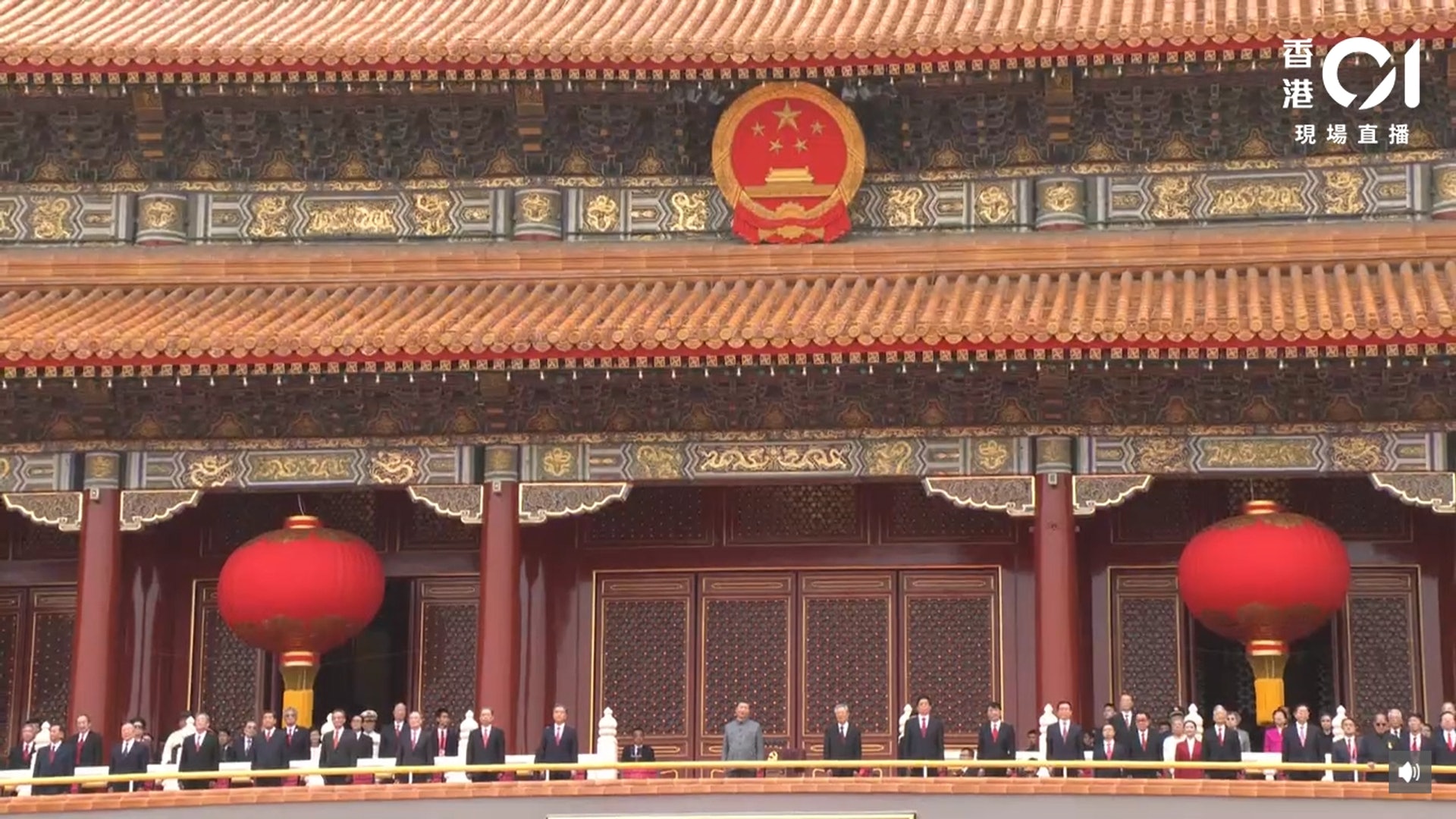
(01直播截圖)
——為了實現中華民族偉大復興,中國共產黨團結帶領中國人民,浴血奮戰、百折不撓,創造了新民主主義革命的偉大成就。我們經過北伐戰爭、土地革命戰爭、抗日戰爭、解放戰爭,以武裝的革命反對武裝的反革命,推翻帝國主義、封建主義、官僚資本主義三座大山,建立了人民當家作主的中華人民共和國,實現了民族獨立、人民解放。新民主主義革命的勝利,徹底結束了舊中國半殖民地半封建社會的歷史,徹底結束了舊中國一盤散沙的局面,徹底廢除了列強強加給中國的不平等條約和帝國主義在中國的一切特權,為實現中華民族偉大復興創造了根本社會條件。中國共產黨和中國人民以英勇頑強的奮鬥向世界莊嚴宣告,中國人民站起來了,中華民族任人宰割、飽受欺凌的時代一去不復返了!
——為了實現中華民族偉大復興,中國共產黨團結帶領中國人民,自力更生、發憤圖強,創造了社會主義革命和建設的偉大成就。我們進行社會主義革命,消滅在中國延續幾千年的封建剝削壓迫制度,確立社會主義基本制度,推進社會主義建設,戰勝帝國主義、霸權主義的顛覆破壞和武裝挑釁,實現了中華民族有史以來最為廣泛而深刻的社會變革,實現了一窮二白、人口眾多的東方大國大步邁進社會主義社會的偉大飛躍,為實現中華民族偉大復興奠定了根本政治前提和制度基礎。中國共產黨和中國人民以英勇頑強的奮鬥向世界莊嚴宣告,中國人民不但善於破壞一個舊世界、也善於建設一個新世界,只有社會主義才能救中國,只有中國特色社會主義才能發展中國!
——為了實現中華民族偉大復興,中國共產黨團結帶領中國人民,解放思想、銳意進取,創造了改革開放和社會主義現代化建設的偉大成就。我們實現新中國成立以來黨的歷史上具有深遠意義的偉大轉折,確立黨在社會主義初級階段的基本路線,堅定不移推進改革開放,戰勝來自各方面的風險挑戰,開創、堅持、捍衛、發展中國特色社會主義,實現了從高度集中的計劃經濟體制到充滿活力的社會主義市場經濟體制、從封閉半封閉到全方位開放的歷史性轉變,實現了從生產力相對落後的狀況到經濟總量躍居世界第二的歷史性突破,實現了人民生活從溫飽不足到總體小康、奔向全面小康的歷史性跨越,為實現中華民族偉大復興提供了充滿新的活力的體制保證和快速發展的物質條件。中國共產黨和中國人民以英勇頑強的奮鬥向世界莊嚴宣告,改革開放是決定當代中國前途命運的關鍵一招,中國大踏步趕上了時代!
——為了實現中華民族偉大復興,中國共產黨團結帶領中國人民,自信自強、守正創新,統攬偉大鬥爭、偉大工程、偉大事業、偉大夢想,創造了新時代中國特色社會主義的偉大成就。黨的十八大以來,中國特色社會主義進入新時代,我們堅持和加強黨的全面領導,統籌推進「五位一體」總體布局、協調推進「四個全面」戰略布局,堅持和完善中國特色社會主義制度、推進國家治理體系和治理能力現代化,堅持依規治黨、形成比較完善的黨內法規體系,戰勝一系列重大風險挑戰,實現第一個百年奮鬥目標,明確實現第二個百年奮鬥目標的戰略安排,黨和國家事業取得歷史性成就、發生歷史性變革,為實現中華民族偉大復興提供了更為完善的制度保證、更為堅實的物質基礎、更為主動的精神力量。中國共產黨和中國人民以英勇頑強的奮鬥向世界莊嚴宣告,中華民族迎來了從站起來、富起來到強起來的偉大飛躍,實現中華民族偉大復興進入了不可逆轉的歷史進程!
一百年來,中國共產黨團結帶領中國人民,以「為有犧牲多壯志,敢教日月換新天」的大無畏氣概,書寫了中華民族幾千年歷史上最恢宏的史詩。這一百年來開辟的偉大道路、創造的偉大事業、取得的偉大成就,必將載入中華民族發展史冊、人類文明發展史冊!
同志們、朋友們!
一百年前,中國共產黨的先驅們創建了中國共產黨,形成了堅持真理、堅守理想,踐行初心、擔當使命,不怕犧牲、英勇鬥爭,對黨忠誠、不負人民的偉大建黨精神,這是中國共產黨的精神之源。
一百年來,中國共產黨弘揚偉大建黨精神,在長期奮鬥中構建起中國共產黨人的精神譜系,錘煉出鮮明的政治品格。歷史川流不息,精神代代相傳。我們要繼續弘揚光榮傳統、賡續紅色血脈,永遠把偉大建黨精神繼承下去、發揚光大!
同志們、朋友們!
一百年來,我們取得的一切成就,是中國共產黨人、中國人民、中華民族團結奮鬥的結果。以毛澤東同志、鄧小平同志、江澤民同志、胡錦濤同志為主要代表的中國共產黨人,為中華民族偉大復興建立了彪炳史冊的偉大功勛!我們向他們表示崇高的敬意!
此時此刻,我們深切懷念為中國革命、建設、改革,為中國共產黨建立、鞏固、發展作出重大貢獻的毛澤東、周恩來、劉少奇、朱德、鄧小平、陳雲同志等老一輩革命家,深切懷念為建立、捍衛、建設新中國英勇犧牲的革命先烈,深切懷念為改革開放和社會主義現代化建設英勇獻身的革命烈士,深切懷念近代以來為民族獨立和人民解放頑強奮鬥的所有仁人志士。他們為祖國和民族建立的豐功偉績永載史冊!他們的崇高精神永遠銘記在人民心中!
人民是歷史的創造者,是真正的英雄。我代表黨中央,向全國廣大工人、農民、知識分子,向各民主黨派和無黨派人士、各人民團體、各界愛國人士,向人民解放軍指戰員、武警部隊官兵、公安干警和消防救援隊伍指戰員,向全體社會主義勞動者,向統一戰線廣大成員,致以崇高的敬意!向香港特別行政區同胞、澳門特別行政區同胞和台灣同胞以及廣大僑胞,致以誠摯的問候!向一切同中國人民友好相處,關心和支持中國革命、建設、改革事業的各國人民和朋友,致以衷心的謝意!
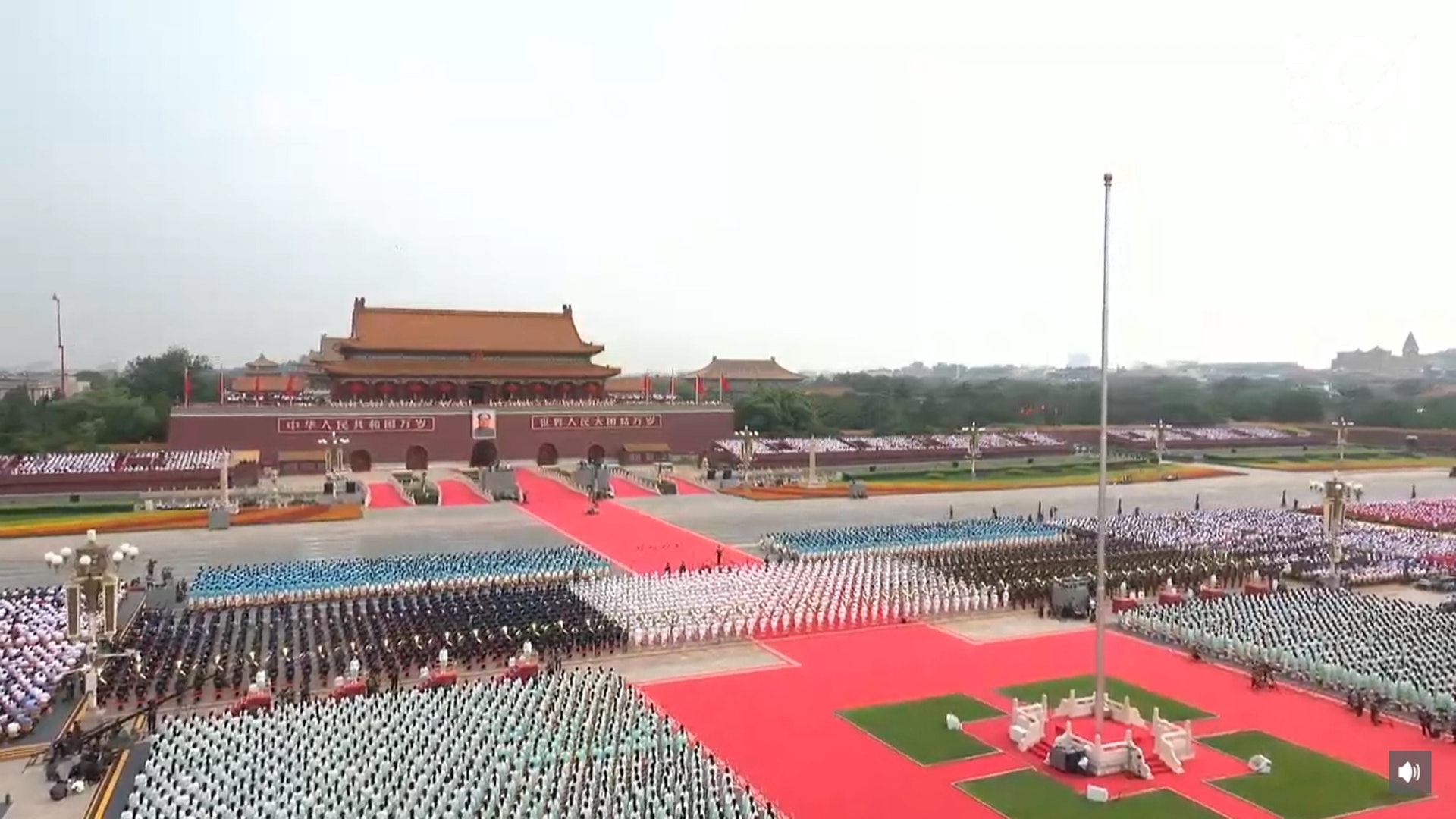
(01直播截圖)
同志們、朋友們!
初心易得,始終難守。以史為鑑,可以知興替。我們要用歷史映照現實、遠觀未來,從中國共產黨的百年奮鬥中看清楚過去我們為甚麼能夠成功、弄明白未來我們怎樣才能繼續成功,從而在新的征程上更加堅定、更加自覺地牢記初心使命、開創美好未來。
——以史為鑑、開創未來,必須堅持中國共產黨堅強領導。辦好中國的事情,關鍵在黨。中華民族近代以來180多年的歷史、中國共產黨成立以來100年的歷史、中華人民共和國成立以來70多年的歷史都充分證明,沒有中國共產黨,就沒有新中國,就沒有中華民族偉大復興。歷史和人民選擇了中國共產黨。中國共產黨領導是中國特色社會主義最本質的特徵,是中國特色社會主義制度的最大優勢,是黨和國家的根本所在、命脈所在,是全國各族人民的利益所繫、命運所繫。
新的征程上,我們必須堅持黨的全面領導,不斷完善黨的領導,增強「四個意識」、堅定「四個自信」、做到「兩個維護」,牢記「國之大者」,不斷提高黨科學執政、民主執政、依法執政水平,充分發揮黨總攬全局、協調各方的領導核心作用!
——以史為鑑、開創未來,必須團結帶領中國人民不斷為美好生活而奮鬥。江山就是人民、人民就是江山,打江山、守江山,守的是人民的心。中國共產黨根基在人民、血脈在人民、力量在人民。中國共產黨始終代表最廣大人民根本利益,與人民休戚與共、生死相依,沒有任何自己特殊的利益,從來不代表任何利益集團、任何權勢團體、任何特權階層的利益。任何想把中國共產黨同中國人民分割開來、對立起來的企圖,都是絕不會得逞的!9500多萬中國共產黨人不答應!14億多中國人民也不答應!
新的征程上,我們必須緊緊依靠人民創造歷史,堅持全心全意為人民服務的根本宗旨,站穩人民立場,貫徹黨的群眾路線,尊重人民首創精神,踐行以人民為中心的發展思想,發展全過程人民民主,維護社會公平正義,着力解決發展不平衡不充分問題和人民群眾急難愁盼問題,推動人的全面發展、全體人民共同富裕取得更為明顯的實質性進展!
——以史為鑑、開創未來,必須繼續推進馬克思主義中國化。馬克思主義是我們立黨立國的根本指導思想,是我們黨的靈魂和旗幟。中國共產黨堅持馬克思主義基本原理,堅持實事求是,從中國實際出發,洞察時代大勢,把握歷史主動,進行艱辛探索,不斷推進馬克思主義中國化時代化,指導中國人民不斷推進偉大社會革命。中國共產黨為甚麼能,中國特色社會主義為甚麼好,歸根到底是因為馬克思主義行!
新的征程上,我們必須堅持馬克思列寧主義、毛澤東思想、鄧小平理論、」三個代表」重要思想、科學發展觀,全面貫徹新時代中國特色社會主義思想,堅持把馬克思主義基本原理同中國具體實際相結合、同中華優秀傳統文化相結合,用馬克思主義觀察時代、把握時代、引領時代,繼續發展當代中國馬克思主義、21世紀馬克思主義!
——以史為鑑、開創未來,必須堅持和發展中國特色社會主義。走自己的路,是黨的全部理論和實踐立足點,更是黨百年奮鬥得出的歷史結論。中國特色社會主義是黨和人民歷經千辛萬苦、付出巨大代價取得的根本成就,是實現中華民族偉大復興的正確道路。我們堅持和發展中國特色社會主義,推動物質文明、政治文明、精神文明、社會文明、生態文明協調發展,創造了中國式現代化新道路,創造了人類文明新形態。
新的征程上,我們必須堅持黨的基本理論、基本路線、基本方略,統籌推進「五位一體」總體布局、協調推進「四個全面」戰略布局,全面深化改革開放,立足新發展階段,完整、準確、全面貫徹新發展理念,構建新發展格局,推動高質量發展,推進科技自立自強,保證人民當家作主,堅持依法治國,堅持社會主義核心價值體系,堅持在發展中保障和改善民生,堅持人與自然和諧共生,協同推進人民富裕、國家強盛、中國美麗。
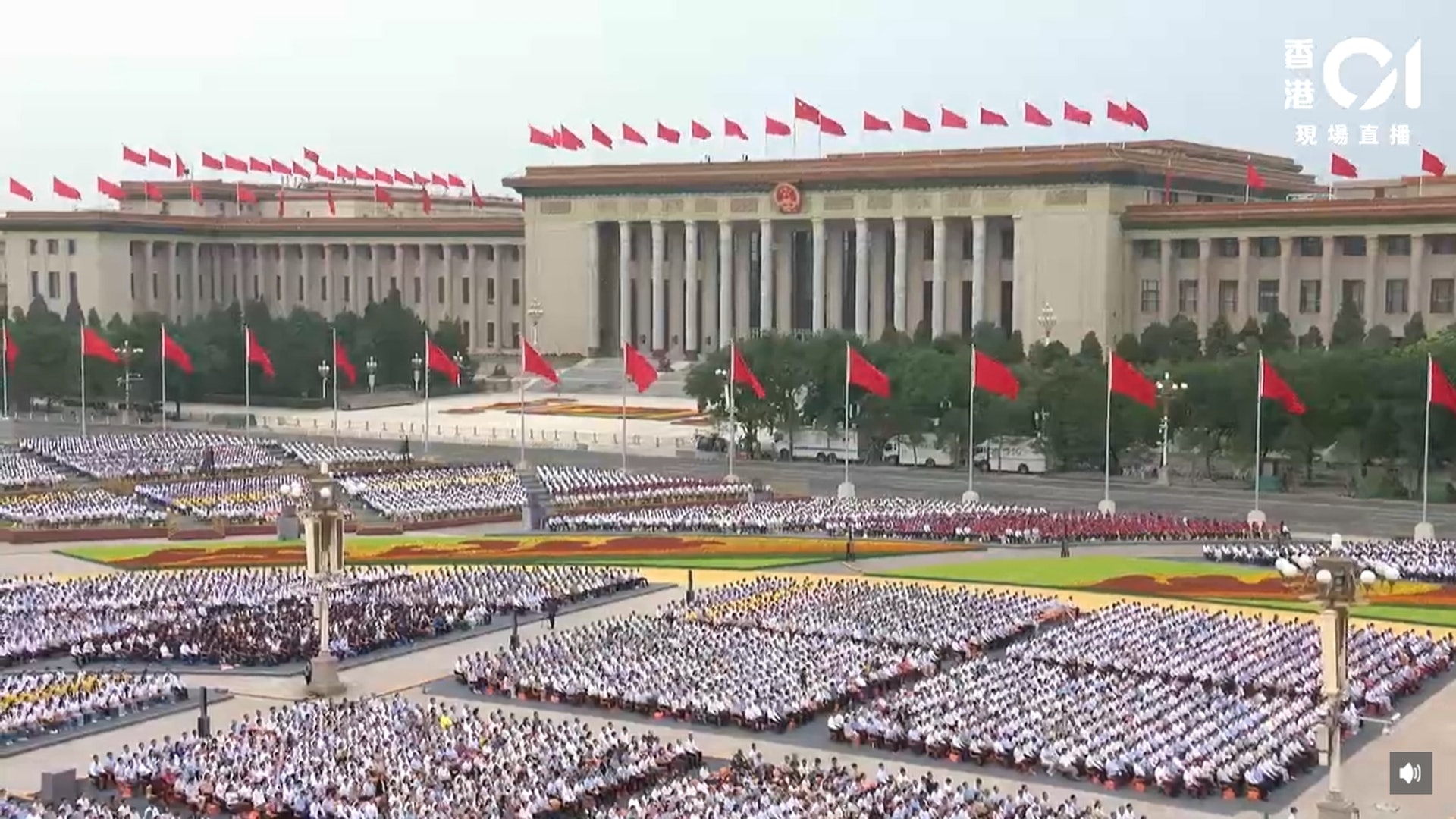
(01直播截圖)
中華民族擁有在5000多年歷史演進中形成的燦爛文明,中國共產黨擁有百年奮鬥實踐和70多年執政興國經驗,我們積極學習借鑑人類文明的一切有益成果,歡迎一切有益的建議和善意的批評,但我們絕不接受「教師爺」般頤指氣使的說教!中國共產黨和中國人民將在自己選擇的道路上昂首闊步走下去,把中國發展進步的命運牢牢掌握在自己手中!
——以史為鑑、開創未來,必須加快國防和軍隊現代化。強國必須強軍,軍強才能國安。堅持黨指揮槍、建設自己的人民軍隊,是黨在血與火的鬥爭中得出的顛撲不破的真理。人民軍隊為黨和人民建立了不朽功勛,是保衛紅色江山、維護民族尊嚴的堅強柱石,也是維護地區和世界和平的強大力量。
新的征程上,我們必須全面貫徹新時代黨的強軍思想,貫徹新時代軍事戰略方針,堅持黨對人民軍隊的絕對領導,堅持走中國特色強軍之路,全面推進政治建軍、改革強軍、科技強軍、人才強軍、依法治軍,把人民軍隊建設成為世界一流軍隊,以更強大的能力、更可靠的手段捍衛國家主權、安全、發展利益!
——以史為鑑、開創未來,必須不斷推動構建人類命運共同體。和平、和睦、和諧是中華民族5000多年來一直追求和傳承的理念,中華民族的血液中沒有侵略他人、稱王稱霸的基因。中國共產黨關注人類前途命運,同世界上一切進步力量攜手前進,中國始終是世界和平的建設者、全球發展的貢獻者、國際秩序的維護者!
新的征程上,我們必須高舉和平、發展、合作、共贏旗幟,奉行獨立自主的和平外交政策,堅持走和平發展道路,推動建設新型國際關係,推動構建人類命運共同體,推動共建「一帶一路」高質量發展,以中國的新發展為世界提供新機遇。中國共產黨將繼續同一切愛好和平的國家和人民一道,弘揚和平、發展、公平、正義、民主、自由的全人類共同價值,堅持合作、不搞對抗,堅持開放、不搞封閉,堅持互利共贏、不搞零和博弈,反對霸權主義和強權政治,推動歷史車輪向着光明的目標前進!
中國人民是崇尚正義、不畏強暴的人民,中華民族是具有強烈民族自豪感和自信心的民族。中國人民從來沒有欺負、壓迫、奴役過其他國家人民,過去沒有,現在沒有,將來也不會有。同時,中國人民也絕不允許任何外來勢力欺負、壓迫、奴役我們,誰妄想這樣干,必將在14億多中國人民用血肉築成的鋼鐵長城面前碰得頭破血流!
——以史為鑑、開創未來,必須進行具有許多新的歷史特點的偉大鬥爭。敢於鬥爭、敢於勝利,是中國共產黨不可戰勝的強大精神力量。實現偉大夢想就要頑強拼搏、不懈奮鬥。今天,我們比歷史上任何時期都更接近、更有信心和能力實現中華民族偉大復興的目標,同時必須準備付出更為艱巨、更為艱苦的努力。
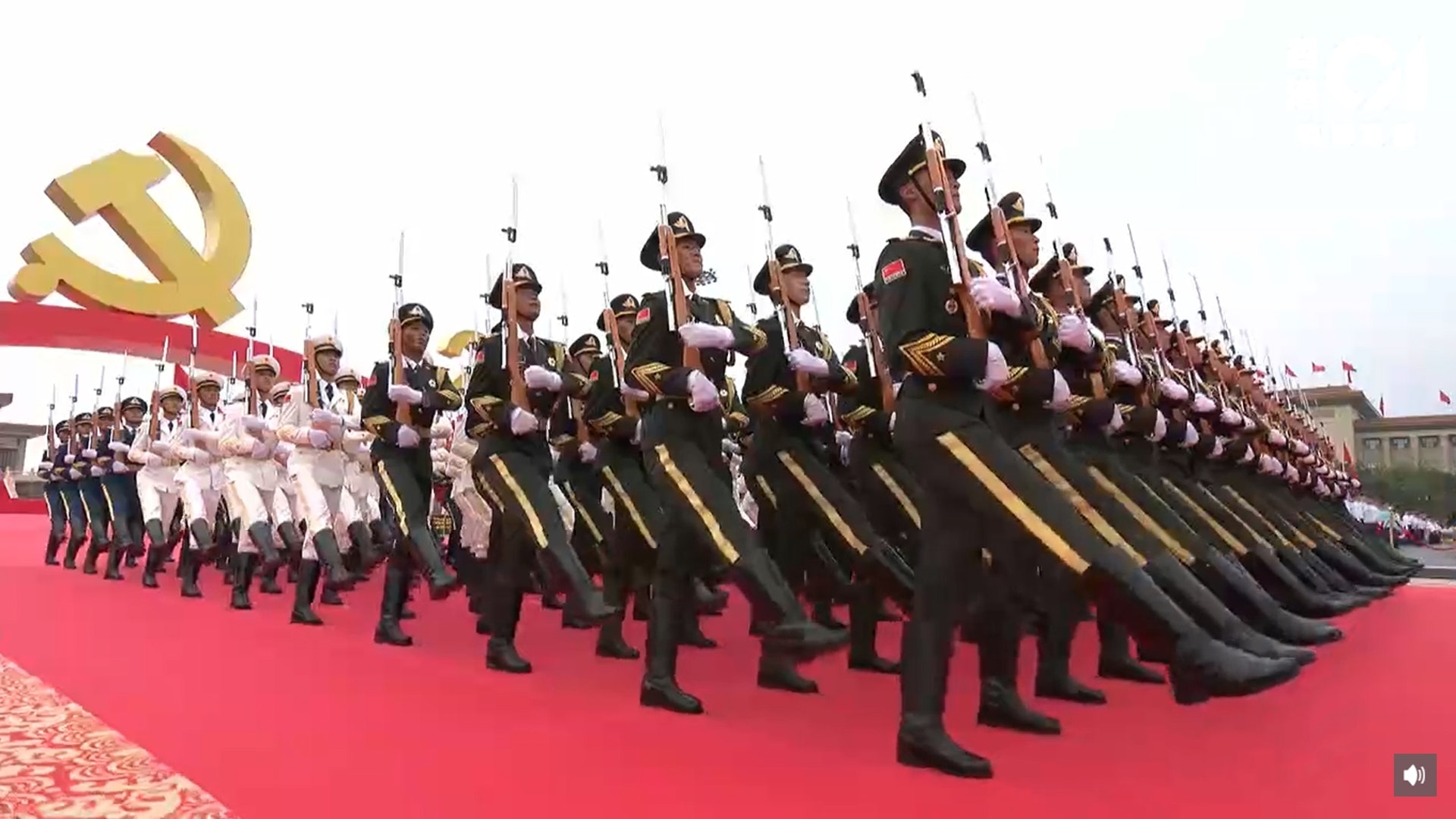
(01直播截圖)
新的征程上,我們必須增強憂患意識、始終居安思危,貫徹總體國家安全觀,統籌發展和安全,統籌中華民族偉大復興戰略全局和世界百年未有之大變局,深刻認識我國社會主要矛盾變化帶來的新特徵新要求,深刻認識錯綜複雜的國際環境帶來的新矛盾新挑戰,敢於鬥爭,善於鬥爭,逢山開道、遇水架橋,勇於戰勝一切風險挑戰!
——以史為鑑、開創未來,必須加強中華兒女大團結。在百年奮鬥歷程中,中國共產黨始終把統一戰線擺在重要位置,不斷鞏固和發展最廣泛的統一戰線,團結一切可以團結的力量、調動一切可以調動的積極因素,最大限度凝聚起共同奮鬥的力量。愛國統一戰線是中國共產黨團結海內外全體中華兒女實現中華民族偉大復興的重要法寶。
新的征程上,我們必須堅持大團結大聯合,堅持一致性和多樣性統一,加強思想政治引領,廣泛凝聚共識,廣聚天下英才,努力尋求最大公約數、畫出最大同心圓,形成海內外全體中華兒女心往一處想、勁往一處使的生動局面,匯聚起實現民族復興的磅礡力量!
——以史為鑑、開創未來,必須不斷推進黨的建設新的偉大工程。勇於自我革命是中國共產黨區別於其他政黨的顯着標志。我們黨歷經千錘百煉而朝氣蓬勃,一個很重要的原因就是我們始終堅持黨要管黨、全面從嚴治黨,不斷應對好自身在各個歷史時期面臨的風險考驗,確保我們黨在世界形勢深刻變化的歷史進程中始終走在時代前列,在應對國內外各種風險挑戰的歷史進程中始終成為全國人民的主心骨!
新的征程上,我們要牢記打鐵必須自身硬的道理,增強全面從嚴治黨永遠在路上的政治自覺,以黨的政治建設為統領,繼續推進新時代黨的建設新的偉大工程,不斷嚴密黨的組織體系,着力建設德才兼備的高素質干部隊伍,堅定不移推進黨風廉政建設和反腐敗鬥爭,堅決清除一切損害黨的先進性和純潔性的因素,清除一切侵蝕黨的健康肌體的病毒,確保黨不變質、不變色、不變味,確保黨在新時代堅持和發展中國特色社會主義的歷史進程中始終成為堅強領導核心!
同志們、朋友們!
我們要全面準確貫徹「一國兩制」、「港人治港」、「澳人治澳」、高度自治的方針,落實中央對香港、澳門特別行政區全面管治權,落實特別行政區維護國家安全的法律制度和執行機制,維護國家主權、安全、發展利益,維護特別行政區社會大局穩定,保持香港、澳門長期繁榮穩定。
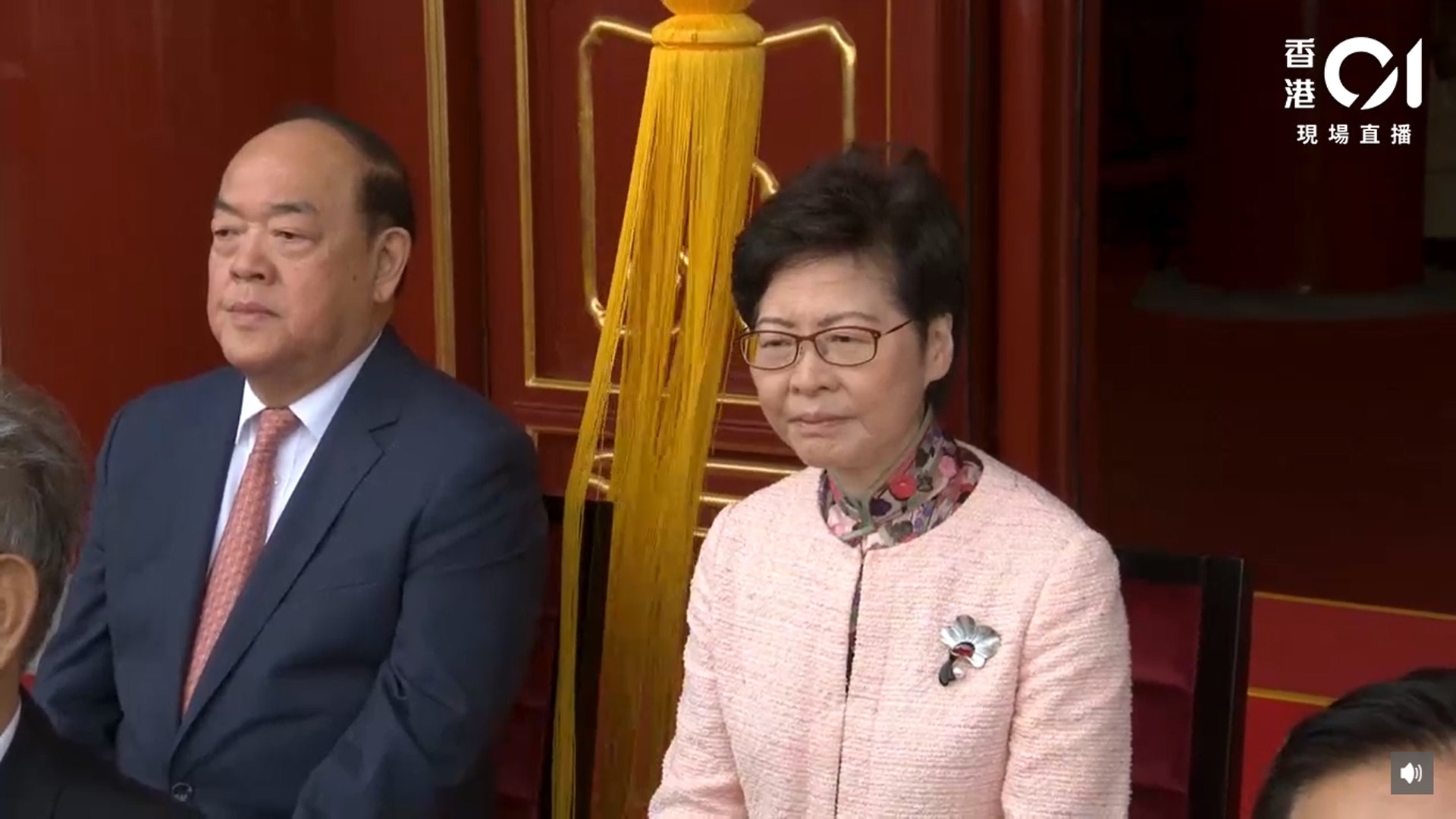
(01直播截圖)
解決台灣問題、實現祖國完全統一,是中國共產黨矢志不渝的歷史任務,是全體中華兒女的共同願望。要堅持一個中國原則和「九二共識」,推進祖國和平統一進程。包括兩岸同胞在內的所有中華兒女,要和衷共濟、團結向前,堅決粉碎任何「台獨」圖謀,共創民族復興美好未來。任何人都不要低估中國人民捍衛國家主權和領土完整的堅強決心、堅定意志、強大能力!
同志們、朋友們!
未來屬於青年,希望寄予青年。一百年前,一群新青年高舉馬克思主義思想火炬,在風雨如晦的中國苦苦探尋民族復興的前途。一百年來,在中國共產黨的旗幟下,一代代中國青年把青春奮鬥融入黨和人民事業,成為實現中華民族偉大復興的先鋒力量。新時代的中國青年要以實現中華民族偉大復興為己任,增強做中國人的志氣、骨氣、底氣,不負時代,不負韶華,不負黨和人民的殷切期望!
同志們、朋友們!
一百年前,中國共產黨成立時只有50多名黨員,今天已經成為擁有9500多萬名黨員、領導着14億多人口大國、具有重大全球影響力的世界第一大執政黨。
一百年前,中華民族呈現在世界面前的是一派衰敗凋零的景像。今天,中華民族向世界展現的是一派欣欣向榮的氣像,正以不可阻擋的步伐邁向偉大復興。
過去一百年,中國共產黨向人民、向歷史交出了一份優異的答卷。現在,中國共產黨團結帶領中國人民又踏上了實現第二個百年奮鬥目標新的趕考之路。
全體中國共產黨員!黨中央號召你們,牢記初心使命,堅定理想信念,踐行黨的宗旨,永遠保持同人民群眾的血肉聯繫,始終同人民想在一起、干在一起,風雨同舟、同甘共苦,繼續為實現人民對美好生活的嚮往不懈努力,努力為黨和人民爭取更大光榮!
同志們、朋友們!
中國共產黨立志於中華民族千秋偉業,百年恰是風華正茂!回首過去,展望未來,有中國共產黨的堅強領導,有全國各族人民的緊密團結,全面建成社會主義現代化強國的目標一定能夠實現,中華民族偉大復興的中國夢一定能夠實現!
偉大、光榮、正確的中國共產黨萬歲!
偉大、光榮、英雄的中國人民萬歲!
__________
Full text of Xi Jinping's speech on the CCP's 100th anniversary
Xi touches on the party's founding, China's economic rise, Hong Kong and Taiwan

Below is an official English-language translation of the full speech provided by the CCP via Xinhua News Agency:
"Comrades and friends,
Today, the first of July, is a great and solemn day in the history of both the Communist Party of China (CPC) and the Chinese nation. We gather here to join all Party members and Chinese people of all ethnic groups around the country in celebrating the centenary of the Party, looking back on the glorious journey the Party has traveled over 100 years of struggle, and looking ahead to the bright prospects for the rejuvenation of the Chinese nation.
To begin, let me extend warm congratulations to all Party members on behalf of the CPC Central Committee.
On this special occasion, it is my honor to declare on behalf of the Party and the people that through the continued efforts of the whole Party and the entire nation, we have realized the first centenary goal of building a moderately prosperous society in all respects. This means that we have brought about a historic resolution to the problem of absolute poverty in China, and we are now marching in confident strides toward the second centenary goal of building China into a great modern socialist country in all respects. This is a great and glorious accomplishment for the Chinese nation, for the Chinese people, and for the Communist Party of China!
Comrades and friends,
The Chinese nation is a great nation. With a history of more than 5,000 years, China has made indelible contributions to the progress of human civilization. After the Opium War of 1840, however, China was gradually reduced to a semi-colonial, semi-feudal society and suffered greater ravages than ever before. The country endured intense humiliation, the people were subjected to great pain, and the Chinese civilization was plunged into darkness. Since that time, national rejuvenation has been the greatest dream of the Chinese people and the Chinese nation.
To save the nation from peril, the Chinese people put up a courageous fight. As noble-minded patriots sought to pull the nation together, the Taiping Heavenly Kingdom Movement, the Reform Movement of 1898, the Yihetuan Movement, and the Revolution of 1911 rose one after the other, and a variety of plans were devised to ensure national survival, but all of these ended in failure. China was in urgent need of new ideas to lead the movement to save the nation and a new organization to rally revolutionary forces.
With the salvoes of Russia's October Revolution in 1917, Marxism-Leninism was brought to China. Then in 1921, as the Chinese people and the Chinese nation were undergoing a great awakening and Marxism-Leninism was becoming closely integrated with the Chinese workers' movement, the Communist Party of China was born. The founding of a communist party in China was an epoch-making event, which profoundly changed the course of Chinese history in modern times, transformed the future of the Chinese people and nation, and altered the landscape of world development.
Since the very day of its founding, the Party has made seeking happiness for the Chinese people and rejuvenation for the Chinese nation its aspiration and mission. All the struggle, sacrifice, and creation through which the Party has united and led the Chinese people over the past hundred years has been tied together by one ultimate theme-bringing about the great rejuvenation of the Chinese nation.
To realize national rejuvenation, the Party united and led the Chinese people in fighting bloody battles with unyielding determination, achieving great success in the new-democratic revolution.
Through the Northern Expedition, the Agrarian Revolutionary War, the War of Resistance against Japanese Aggression, and the War of Liberation, we fought armed counter-revolution with armed revolution, toppling the three mountains of imperialism, feudalism, and bureaucrat-capitalism and establishing the People's Republic of China, which made the people masters of the country. We thus secured our nation's independence and liberated our people.
The victory of the new-democratic revolution put an end to China's history as a semi-colonial, semi-feudal society, to the state of total disunity that existed in old China, and to all the unequal treaties imposed on our country by foreign powers and all the privileges that imperialist powers enjoyed in China. It created the fundamental social conditions for realizing national rejuvenation.
Through tenacious struggle, the Party and the Chinese people showed the world that the Chinese people had stood up, and that the time in which the Chinese nation could be bullied and abused by others was gone forever.
To realize national rejuvenation, the Party united and led the Chinese people in endeavoring to build a stronger China with a spirit of self-reliance, achieving great success in socialist revolution and construction.
By carrying out socialist revolution, we eliminated the exploitative and repressive feudal system that had persisted in China for thousands of years, and established socialism as our basic system. In the process of socialist construction, we overcame subversion, sabotage, and armed provocation by imperialist and hegemonic powers, and brought about the most extensive and profound social changes in the history of the Chinese nation. This great transformation of China from a poor and backward country in the East with a large population into a socialist country laid down the fundamental political conditions and the institutional foundations necessary for realizing national rejuvenation.
Through tenacious struggle, the Party and the Chinese people showed the world that the Chinese people were capable of not only dismantling the old world, but also building a new one, that only socialism could save China, and that only socialism with Chinese characteristics could develop China.
To realize national rejuvenation, the Party united and led the Chinese people in freeing the mind and forging ahead, achieving great success in reform, opening up, and socialist modernization.
We established the Party's basic line for the primary stage of socialism, resolutely advanced reform and opening up, overcame risks and challenges from every direction, and founded, upheld, safeguarded, and developed socialism with Chinese characteristics, thus bringing about a major turn with far-reaching significance in the history of the Party since the founding of the People's Republic of China. This enabled China to transform itself from a highly centralized planned economy to a socialist market economy brimming with vitality, and from a country that was largely isolated to one that is open to the outside world across the board. It also enabled China to achieve the historic leap from a country with relatively backward productive forces to the world's second largest economy, and to make the historic transformation of raising the living standards of its people from bare subsistence to an overall level of moderate prosperity, and then ultimately to moderate prosperity in all respects. These achievements fueled the push toward national rejuvenation by providing institutional guarantees imbued with new energy as well as the material conditions for rapid development.
Through tenacious struggle, the Party and the Chinese people showed the world that by pursuing reform and opening up, a crucial move in making China what it is today, China had caught up with the times in great strides.
To realize national rejuvenation, the Party has united and led the Chinese people in pursuing a great struggle, a great project, a great cause, and a great dream through a spirit of self-confidence, self-reliance, and innovation, achieving great success for socialism with Chinese characteristics in the new era.
Following the Party's 18th National Congress, socialism with Chinese characteristics entered a new era. In this new era, we have upheld and strengthened the Party's overall leadership, ensured coordinated implementation of the five-sphere integrated plan and the four-pronged comprehensive strategy, upheld and improved the system of socialism with Chinese characteristics, modernized China's system and capacity for governance, remained committed to exercising rule-based governance over the Party, and developed a sound system of intraparty regulations. We have overcome a long list of major risks and challenges, fulfilled the first centenary goal, and set out strategic steps for achieving the second centenary goal. All the historic achievements and changes in the cause of the Party and the country have provided the cause of national rejuvenation with more robust institutions, stronger material foundations, and a source of inspiration for taking greater initiative.
Through tenacious struggle, the Party and the Chinese people have shown the world that the Chinese nation has achieved the tremendous transformation from standing up and growing prosperous to becoming strong, and that China's national rejuvenation has become a historical inevitability.
Over the past hundred years, the Party has united and led the Chinese people in writing the most magnificent chapter in the millennia-long history of the Chinese nation, embodying the dauntless spirit that Mao Zedong expressed when he wrote, "Our minds grow stronger for the martyrs' sacrifice, daring to make the sun and the moon shine in the new sky." The great path we have pioneered, the great cause we have undertaken, and the great achievements we have made over the past century will go down in the annals of the development of the Chinese nation and of human civilization.
Comrades and friends,
A hundred years ago, the pioneers of Communism in China established the Communist Party of China and developed the great founding spirit of the Party, which is comprised of the following principles: upholding truth and ideals, staying true to our original aspiration and founding mission, fighting bravely without fear of sacrifice, and remaining loyal to the Party and faithful to the people. This spirit is the Party's source of strength.
Over the past hundred years, the Party has carried forward this great founding spirit. Through its protracted struggles, it has developed a long line of inspiring principles for Chinese Communists and tempered a distinct political character. As history has kept moving forward, the spirit of the Party has been passed on from generation to generation. We will continue to promote our glorious traditions and sustain our revolutionary legacy, so that the great founding spirit of the Party will always be kept alive and carried forward.
Comrades and friends,
We owe all that we have achieved over the past hundred years to the concerted efforts of the Chinese Communists, the Chinese people, and the Chinese nation. Chinese Communists, with comrades Mao Zedong, Deng Xiaoping, Jiang Zemin, and Hu Jintao as their chief representatives, have made tremendous and historic contributions to the rejuvenation of the Chinese nation. To them, we express our highest respect.
Let us take this moment to cherish the memory of comrades Mao Zedong, Zhou Enlai, Liu Shaoqi, Zhu De, Deng Xiaoping, Chen Yun, and other veteran revolutionaries who contributed greatly to China's revolution, construction, and reform, and to the founding, consolidation, and development of the Communist Party of China; let us cherish the memory of the revolutionary martyrs who bravely laid down their lives to establish, defend, and develop the People's Republic; let us cherish the memory of those who dedicated their lives to reform, opening up, and socialist modernization; and let us cherish the memory of all the men and women who fought tenaciously for national independence and the liberation of the people in modern times. Their great contributions to our motherland and our nation will be immortalized in the annals of history, and their noble spirit will live on forever in the hearts of the Chinese people.
The people are the true heroes, for it is they who create history. On behalf of the CPC Central Committee, I would like to pay my highest respects to workers, farmers, and intellectuals across the country; to other political parties, public figures without party affiliation, people's organizations, and patriotic figures from all sectors of society; to all members of the People's Liberation Army, the People's Armed Police Force, the public security police, and the fire and rescue services; to all socialist working people; and to all members of the united front. I would like to extend my sincere greetings to compatriots in the Hong Kong and Macao special administrative regions and in Taiwan as well as overseas Chinese. And I would like to express my heartfelt gratitude to people and friends from around the world who have shown friendship to the Chinese people and understanding and support for China's endeavors in revolution, development, and reform.
Comrades and friends,
Though our Party's founding mission is easy to define, ensuring that we stay true to this mission is a more difficult task. By learning from history, we can understand why powers rise and fall. Through the mirror of history, we can find where we currently stand and gain foresight into the future. Looking back on the Party's 100-year history, we can see why we were successful in the past and how we can continue to succeed in the future. This will ensure that we act with greater resolve and purpose in staying true to our founding mission and pursuing a better future on the new journey that lies before us.
As we put conscious effort into learning from history to create a bright future, we must bear the following in mind:
We must uphold the firm leadership of the Party. China's success hinges on the Party. The more than 180-year-long modern history of the Chinese nation, the 100-year-long history of the Party, and the more than 70-year-long history of the People's Republic of China all provide ample evidence that without the Communist Party of China, there would be no new China and no national rejuvenation. The Party was chosen by history and the people. The leadership of the Party is the defining feature of socialism with Chinese characteristics and constitutes the greatest strength of this system. It is the foundation and lifeblood of the Party and the country, and the crux upon which the interests and wellbeing of all Chinese people depend.
On the journey ahead, we must uphold the Party's overall leadership and continue to enhance its leadership. We must be deeply conscious of the need to maintain political integrity, think in big-picture terms, follow the leadership core, and keep in alignment with the central Party leadership. We must stay confident in the path, theory, system, and culture of socialism with Chinese characteristics. We must uphold the core position of the General Secretary on the Party Central Committee and in the Party as a whole, and uphold the Central Committee's authority and its centralized, unified leadership. Bearing in mind the country's most fundamental interests, we must enhance the Party's capacity to conduct sound, democratic, and law-based governance, and ensure that it fully exerts its core role in providing overall leadership and coordinating the efforts of all sides.
We must unite and lead the Chinese people in working ceaselessly for a better life. This country is its people; the people are the country. As we have fought to establish and consolidate our leadership over the country, we have in fact been fighting to earn and keep the people's support. The Party has in the people its roots, its lifeblood, and its source of strength. The Party has always represented the fundamental interests of all Chinese people; it stands with them through thick and thin and shares a common fate with them. The Party has no special interests of its own-it has never represented any individual interest group, power group, or privileged stratum. Any attempt to divide the Party from the Chinese people or to set the people against the Party is bound to fail. The more than 95 million Party members and the more than 1.4 billion Chinese people will never allow such a scenario to come to pass.
On the journey ahead, we must rely closely on the people to create history. Upholding the Party's fundamental purpose of wholeheartedly serving the people, we will stand firmly with the people, implement the Party's mass line, respect the people's creativity, and practice a people-centered philosophy of development. We will develop whole-process people's democracy, safeguard social fairness and justice, and resolve the imbalances and inadequacies in development and the most pressing difficulties and problems that are of great concern to the people. In doing so, we will make more notable and substantive progress toward achieving well-rounded human development and common prosperity for all.
We must continue to adapt Marxism to the Chinese context. Marxism is the fundamental guiding ideology upon which our Party and country are founded; it is the very soul of our Party and the banner under which it strives. The Communist Party of China upholds the basic tenets of Marxism and the principle of seeking truth from facts. Based on China's realities, we have developed keen insights into the trends of the day, seized the initiative in history, and made painstaking explorations. We have thus been able to keep adapting Marxism to the Chinese context and the needs of our times, and to guide the Chinese people in advancing our great social revolution. At the fundamental level, the capability of our Party and the strengths of socialism with Chinese characteristics are attributable to the fact that Marxism works.
On the journey ahead, we must continue to uphold Marxism-Leninism, Mao Zedong Thought, Deng Xiaoping Theory, the Theory of Three Represents, and the Scientific Outlook on Development, and fully implement the Thought on Socialism with Chinese Characteristics for a New Era. We must continue to adapt the basic tenets of Marxism to China's specific realities and its fine traditional culture. We will use Marxism to observe, understand, and steer the trends of our times, and continue to develop the Marxism of contemporary China and in the 21st century.
We must uphold and develop socialism with Chinese characteristics. We must follow our own path-this is the bedrock that underpins all the theories and practices of our Party. More than that, it is the historical conclusion our Party has drawn from its struggles over the past century. Socialism with Chinese characteristics is a fundamental achievement of the Party and the people, forged through innumerable hardships and great sacrifices, and it is the right path for us to achieve national rejuvenation. As we have upheld and developed socialism with Chinese characteristics and driven coordinated progress in material, political, cultural-ethical, social, and ecological terms, we have pioneered a new and uniquely Chinese path to modernization, and created a new model for human advancement.
On the journey ahead, we must adhere to the Party's basic theory, line, and policy, and implement the five-sphere integrated plan and the four-pronged comprehensive strategy. We must deepen reform and opening up across the board, ground our work in this new stage of development, fully and faithfully apply the new development philosophy, and foster a new pattern of development. We must promote high-quality development and build up our country's strength in science and technology. We must ensure it is our people who run the country, continue to govern based on the rule of law, and uphold the core socialist values. We must ensure and enhance public wellbeing in the course of development, promote harmony between humanity and nature, and take well-coordinated steps toward making our people prosperous, our nation strong, and our country beautiful.
The Chinese nation has fostered a splendid civilization over more than 5,000 years of history. The Party has also acquired a wealth of experience through its endeavors over the past 100 years and during more than 70 years of governance. At the same time, we are also eager to learn what lessons we can from the achievements of other cultures, and welcome helpful suggestions and constructive criticism. We will not, however, accept sanctimonious preaching from those who feel they have the right to lecture us. The Party and the Chinese people will keep moving confidently forward in broad strides along the path that we have chosen for ourselves, and we will make sure the destiny of China's development and progress remains firmly in our own hands.
We must accelerate the modernization of national defense and the armed forces. A strong country must have a strong military, as only then can it guarantee the security of the nation. At the point that it was engaged in violent struggle, the Party came to recognize the irrefutable truth that it must command the gun and build a people's military of its own. The people's military has made indelible achievements on behalf of the Party and the people. It is a strong pillar for safeguarding our socialist country and preserving national dignity, and a powerful force for protecting peace in our region and beyond.
On the journey ahead, we must fully implement the Party's thinking on strengthening the military in the new era as well as our military strategy for the new era, maintain the Party's absolute leadership over the people's armed forces, and follow a Chinese path to military development. We will take comprehensive measures to enhance the political loyalty of the armed forces, to strengthen them through reform and technology and the training of competent personnel, and to run them in accordance with the law. We will elevate our people's armed forces to world-class standards so that we are equipped with greater capacity and more reliable means for safeguarding our national sovereignty, security, and development interests.
We must continue working to promote the building of a human community with a shared future. Peace, concord, and harmony are ideas the Chinese nation has pursued and carried forward for more than 5,000 years. The Chinese nation does not carry aggressive or hegemonic traits in its genes. The Party cares about the future of humanity, and wishes to move forward in tandem with all progressive forces around the world. China has always worked to safeguard world peace, contribute to global development, and preserve international order.
On the journey ahead, we will remain committed to promoting peace, development, cooperation, and mutual benefit, to an independent foreign policy of peace, and to the path of peaceful development. We will work to build a new type of international relations and a human community with a shared future, promote high-quality development of the Belt and Road Initiative through joint efforts, and use China's new achievements in development to provide the world with new opportunities. The Party will continue to work with all peace-loving countries and peoples to promote the shared human values of peace, development, fairness, justice, democracy, and freedom. We will continue to champion cooperation over confrontation, to open up rather than closing our doors, and to focus on mutual benefits instead of zero-sum games. We will oppose hegemony and power politics, and strive to keep the wheels of history rolling toward bright horizons.
We Chinese are a people who uphold justice and are not intimidated by threats of force. As a nation, we have a strong sense of pride and confidence. We have never bullied, oppressed, or subjugated the people of any other country, and we never will. By the same token, we will never allow any foreign force to bully, oppress, or subjugate us. Anyone who would attempt to do so will find themselves on a collision course with a great wall of steel forged by over 1.4 billion Chinese people.
We must carry out a great struggle with many contemporary features. Having the courage to fight and the fortitude to win is what has made our Party invincible. Realizing our great dream will require hard work and persistence. Today, we are closer, more confident, and more capable than ever before of making the goal of national rejuvenation a reality. But we must be prepared to work harder than ever to get there.
On the journey ahead, we must demonstrate stronger vigilance and always be prepared for potential danger, even in times of calm. We must adopt a holistic approach to national security that balances development and security imperatives, and implement the national rejuvenation strategy within a wider context of the once-in-a-century changes taking place in the world. We need to acquire a full understanding of the new features and requirements arising from the change to the principal contradiction in Chinese society and the new issues and challenges stemming from a complicated international environment. We must be both brave and adept in carrying out our struggle, forging new paths and building new bridges wherever necessary to take us past all risks and challenges.
We must strengthen the great unity of the Chinese people. In the course of our struggles over the past century, the Party has always placed the united front in a position of importance. We have constantly consolidated and developed the broadest possible united front, united all the forces that can be united, mobilized all positive factors that can be mobilized, and pooled as much strength as possible for collective endeavors. The patriotic united front is an important means for the Party to unite all the sons and daughters of the Chinese nation, both at home and abroad, behind the goal of national rejuvenation.
On the journey ahead, we must ensure great unity and solidarity and balance commonality and diversity. We should strengthen theoretical and political guidance, build broad consensus, bring together the brightest minds, and expand common ground and the convergence of interests, so that all Chinese people, both at home and overseas, can focus their ingenuity and energy on the same goal and come together as a mighty force for realizing national rejuvenation.
We must continue to advance the great new project of Party building. A hallmark that distinguishes the Communist Party of China from other political parties is its courage in undertaking self-reform. An important reason why the Party remains so vital and vibrant despite having undergone so many trials and tribulations is that it practices effective self-supervision and full and rigorous self-governance. It has thus been able to respond appropriately to the risks and tests of different historical periods, to ensure that it always remains at the forefront of the times even as profound changes sweep the global landscape, and to stand firm as the backbone of the nation throughout the process of meeting various risks and challenges at home and abroad.
On the journey ahead, we must keep firmly in mind the old adage that it takes a good blacksmith to make good steel. We must demonstrate greater political awareness of the fact that full and rigorous self-governance is a never-ending journey. With strengthening the Party politically as our overarching principle, we must continue advancing the great new project of Party building in the new era. We must tighten the Party's organizational system, work hard to train high-caliber officials who have both moral integrity and professional competence, remain committed to improving Party conduct, upholding integrity, and combating corruption, and root out any elements that would harm the Party's advanced nature and purity and any viruses that would erode its health. We must ensure that the Party preserves its essence, color, and character, and see that it always serves as the strong leadership core in the course of upholding and developing socialism with Chinese characteristics in the new era.
Comrades and friends,
We will stay true to the letter and spirit of the principle of One Country, Two Systems, under which the people of Hong Kong administer Hong Kong, and the people of Macao administer Macao, both with a high degree of autonomy. We will ensure that the central government exercises overall jurisdiction over Hong Kong and Macao, and implement the legal systems and enforcement mechanisms for the two special administrative regions to safeguard national security. While protecting China's sovereignty, security, and development interests, we will ensure social stability in Hong Kong and Macao, and maintain lasting prosperity and stability in the two special administrative regions.
Resolving the Taiwan question and realizing China's complete reunification is a historic mission and an unshakable commitment of the Communist Party of China. It is also a shared aspiration of all the sons and daughters of the Chinese nation. We will uphold the one-China principle and the 1992 Consensus, and advance peaceful national reunification. All of us, compatriots on both sides of the Taiwan Strait, must come together and move forward in unison. We must take resolute action to utterly defeat any attempt toward "Taiwan independence," and work together to create a bright future for national rejuvenation. No one should underestimate the resolve, the will, and the ability of the Chinese people to defend their national sovereignty and territorial integrity.
Comrades and friends,
The future belongs to the young people, and our hopes also rest with them. A century ago, a group of young progressives held aloft the torch of Marxism and searched assiduously in those dark years for ways to rejuvenate the Chinese nation. Since then, under the banner of the Communist Party of China, generation after generation of young Chinese have devoted their youth to the cause of the Party and the people, and remained in the vanguard of the drive to rejuvenate the nation.
In the new era, our young people should make it their mission to contribute to national rejuvenation and aspire to become more proud, confident, and assured in their identity as Chinese people so that they can live up to the promise of their youth and the expectations of our times, our Party, and our people.
Comrades and friends,
A century ago, at the time of its founding, the Communist Party of China had just over 50 members. Today, with more than 95 million members in a country of more than 1.4 billion people, it is the largest governing party in the world and enjoys tremendous international influence.
A century ago, China was in decline and withering away in the eyes of the world. Today, the image it presents to the world is one of a thriving nation that is advancing with unstoppable momentum toward rejuvenation.
Over the past century, the Communist Party of China has secured extraordinary historical achievements on behalf of the people. Today, it is rallying and leading the Chinese people on a new journey toward realizing the second centenary goal.
To all Party members,
The Central Committee calls on every one of you to stay true to our Party's founding mission and stand firm in your ideals and convictions. Acting on the purpose of the Party, you should always maintain close ties with the people, empathize and work with them, stand with them through good times and bad, and continue working tirelessly to realize their aspirations for a better life and to bring still greater glory to the Party and the people.
Comrades and friends,
Today, a hundred years on from its founding, the Communist Party of China is still in its prime, and remains as determined as ever to achieve lasting greatness for the Chinese nation. Looking back on the path we have travelled and forward to the journey that lies ahead, it is certain that with the firm leadership of the Party and the great unity of the Chinese people of all ethnic groups, we will achieve the goal of building a great modern socialist country in all respects and fulfill the Chinese Dream of national rejuvenation.
Long live our great, glorious, and correct Party!
Long live our great, glorious, and heroic people!"

No comments:
Post a Comment